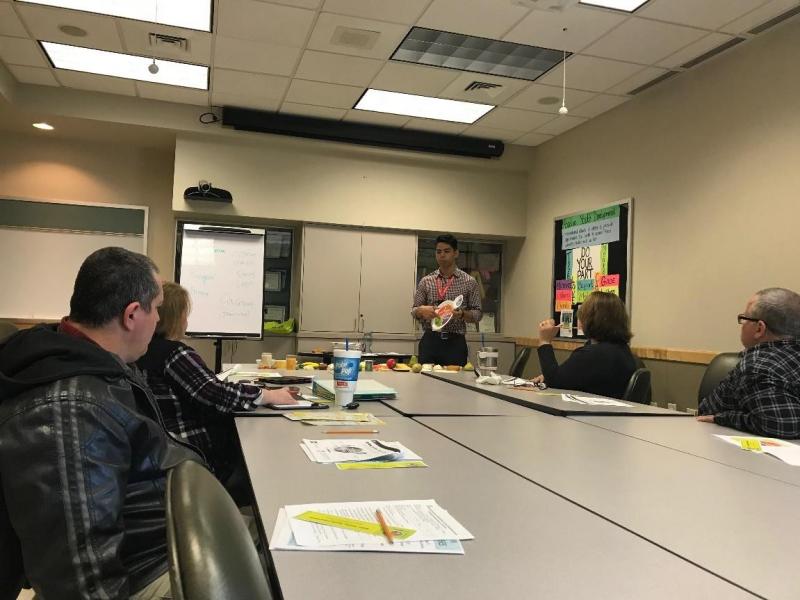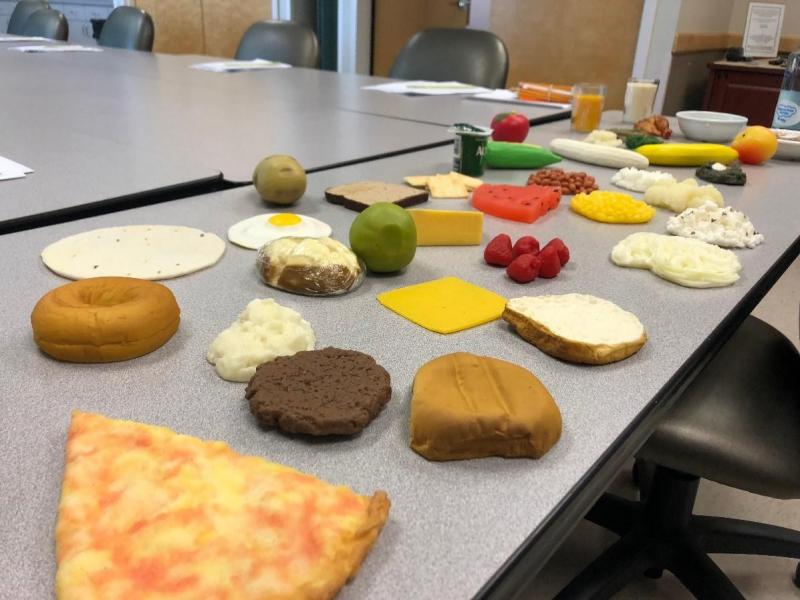Intuitive Eating
 As a health educator in the Florida Department of Health in Baker County, a few of my responsibilities include conducting Nutrition education classes and one on one healthy lifestyle coaching sessions for community members. I love my position because it allows me to serve people who are interested and willing to improve their health and well-being. Because these people are eager to adopt new behaviors and change their lifestyle I want to provide them with the most reliable information and practices out there. Learning about nutrition can be a very intimidating process. To a person that hasn’t been exposed to proper nutrition education it could look like mountains of research and articles that all seem to contradict each other. My goal for the nutrition classes is to empower the participants to make healthier choices that still fit into their lifestyle.
As a health educator in the Florida Department of Health in Baker County, a few of my responsibilities include conducting Nutrition education classes and one on one healthy lifestyle coaching sessions for community members. I love my position because it allows me to serve people who are interested and willing to improve their health and well-being. Because these people are eager to adopt new behaviors and change their lifestyle I want to provide them with the most reliable information and practices out there. Learning about nutrition can be a very intimidating process. To a person that hasn’t been exposed to proper nutrition education it could look like mountains of research and articles that all seem to contradict each other. My goal for the nutrition classes is to empower the participants to make healthier choices that still fit into their lifestyle.
“Why do you eat?” This is one of the questions that I’ll ask at the beginning of every nutrition class series. The typical response starts off with an awkward silence then progresses to a murmur of words like hungry, stressed, sad. Sometimes they get creative and mention things like social settings, feelings of boredom, routine, and fuel. I like asking this question because how simple it appears, but how it also creates the opportunity for a deeper conversation. it creates an opportunity for them to analyze why they decide to eat. Are they making the decision consciously or stuck in a routine? Are they eating the house salad because they enjoy the taste of it or because they’re trying to “be good.” Understanding your bodies internal cues is the first step to eating intuitively.
 Intuitive eating is paying attention to your internal cues for hunger, fullness, and satiety. It’s being present and mindful of what you’re eating, why you’re eating, and even how you’re eating. Many have gotten away from using food to treat their bodies, with foods that it needs and the foods that they like. It’s often we see food being used to manipulate our bodies size. Fad diets claim to lead to weight loss and other added health benefits. Usually within a short amount of time. When people follow these diets there are some that find long term success, but the majority experience something else. Many consistent outcomes related with following fad diets is constant weight cycling, negative body image, and stigmatizing of foods by labeling them as “good” and “bad”. A simple way to identify a fad diet is if it sounds too good to be true. Research has shown that weight is only one factor in health status. Being a certain weight does not always indicate a certain health status. There is no one healthy “weight” or “body size”. They found that practicing healthy behaviors like engaging in physical activity, and making healthy eating choices, is more of a factor of all-cause mortality than someone’s weight status (NCBI). Stigmatizing body sizes, weight, and certain foods is not a good tool for behavior change. Their impact is so much more than simply motivating someone to “be healthier”. When we make stigmatizing statements about weight and size it can cause lower self-esteem in people who are first starting out. When we tell someone, that certain foods are “healthy” and “unhealthy” it makes them feel low and weak when they indulge. The impact of promoting ideal body types has created a culture that needs to change.
Intuitive eating is paying attention to your internal cues for hunger, fullness, and satiety. It’s being present and mindful of what you’re eating, why you’re eating, and even how you’re eating. Many have gotten away from using food to treat their bodies, with foods that it needs and the foods that they like. It’s often we see food being used to manipulate our bodies size. Fad diets claim to lead to weight loss and other added health benefits. Usually within a short amount of time. When people follow these diets there are some that find long term success, but the majority experience something else. Many consistent outcomes related with following fad diets is constant weight cycling, negative body image, and stigmatizing of foods by labeling them as “good” and “bad”. A simple way to identify a fad diet is if it sounds too good to be true. Research has shown that weight is only one factor in health status. Being a certain weight does not always indicate a certain health status. There is no one healthy “weight” or “body size”. They found that practicing healthy behaviors like engaging in physical activity, and making healthy eating choices, is more of a factor of all-cause mortality than someone’s weight status (NCBI). Stigmatizing body sizes, weight, and certain foods is not a good tool for behavior change. Their impact is so much more than simply motivating someone to “be healthier”. When we make stigmatizing statements about weight and size it can cause lower self-esteem in people who are first starting out. When we tell someone, that certain foods are “healthy” and “unhealthy” it makes them feel low and weak when they indulge. The impact of promoting ideal body types has created a culture that needs to change.
Instead, we should be teaching people to enjoy what they eat and be mindful to it. Our bodies have needs and wants and we should be able to find a compromise. That compromise can be getting a variety of different foods like vegetables, proteins, grains, fruits, and dairy, by choosing the type of foods that we like in each category. Cook them the way you prefer. Eat when you know you’re hungry and stop before you get too full. Try to only focus on the food when eating by sitting away from the TV and putting the phone down. Take a break halfway through your meal to check in with yourself. Remember, there is no good or bad foods. Just practice moderation, and be compassionate with yourself.
For more information on:
Nutrition - https://www.choosemyplate.gov/
Eating Disorders - https://www.nationaleatingdisorders.org/
Fitness vs. fatness Research - https://www.ncbi.nlm.nih.gov/pubmed/24438729
This blog post was written by RJ Tapales.
RJ serves at FDOH in Baker County as a Health Educator.